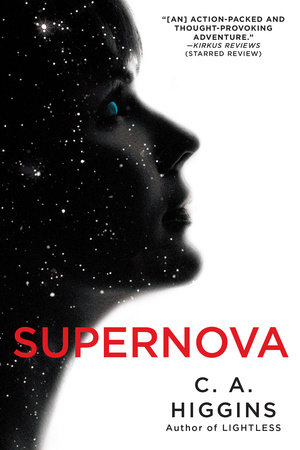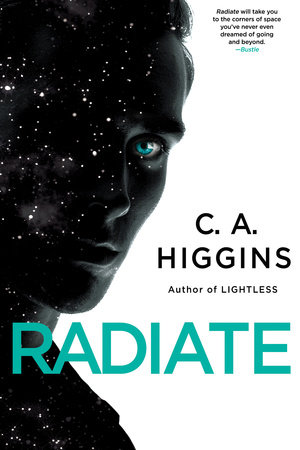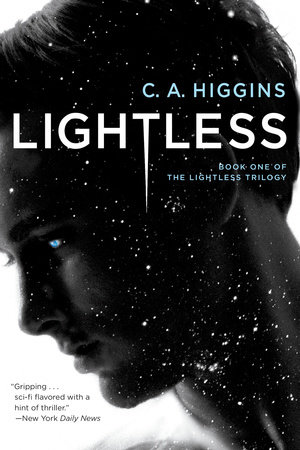Excerpt
Supernova
Chapter 1
Ignition
SIX MONTHS BEFORE THE FALL OF EARTH
In the instant after the bomb went off, Constance was a little girl again, on Miranda and waiting for the next System explosion to shear the skin from her bones. A little girl could hide the way an adult could not, huddled down like a cub in a den. A young thing hid because there was nothing else it could do.
But there was no true hiding here. The System saw them all. Her friends—her family, such as it was—were near her, she knew. But there was nothing she could do to save them and there was nothing they could to do save her, and so even though they were near, she was alone. The unstoppable power of the explosion would tear her limb from limb and the System’s cameras would watch with a machine’s chill indifference, and there was nothing, nothing, that she could do in this moment but wait to die.
But Constance wasn’t on Miranda anymore. She was on Pallas, and she was a woman grown, not a little girl. And the bomb that had gone off had been hers.
The rock dust from the explosion billowed. Pallas’s gravity was so low that it could take days for it to settle back down again. The particles reached so high that they dusted against the glassy ceiling of the segmented greenhouse enclosure that separated Pallas’s manufactured atmosphere from the distant stars. Constance stepped out from behind the stone in whose shadow she had sheltered to watch the dust and smoke poison the atmosphere. Some distance behind her, the glass walls that separated this segment of the greenhouse enclosure from the adjoining section shivered with the shock wave of the blast.
“Nice job,” said Mattie with a cough, coming out from behind a different stone windbreak. There was blood on his cheek already, but they weren’t nearly done yet.
Ivan, following him out, was unbloodied. His blue eyes were as clear and distant as the starscape overhead, the one slowly being concealed by the creeping smoke
“Masks on,” Constance said. Mattie took his oxygen mask from Ivan and fitted it over his nose and mouth, but when Ivan handed Constance her mask, his fingers captured hers.
“Keep your head,” he said. After the warmth of Mattie’s Mirandan tenor, the sharp clarity of his Terran accent was startling. Constance did not bother to respond.
“The smoke’s spreading pretty fast,” Mattie said through the mask, with a speculative eye on the dust from the explosion that was already brushing against the shell of the greenhouse enclosure. When the sensors inside the greenhouse enclosure sensed the smoke, Constance knew, they would close off this segment of the enclosure to keep the other segments open and livable.
“How long?” she asked.
She knew Mattie was grinning by the crinkles near his eyes. “I think the System’s got maybe half an hour before they’re trapped in here.”
“Then so do we,” said Ivan, and put his own mask on.
The front of the slow, thick cloud of debris had almost reached them. “Let’s go,” Constance said, and stepped into the smoke and dusted stone.
The sunlight was dim and distant on Pallas but not as distant as it had been on Miranda, where Constance had been born. She was used to seeing by the light of her own eyes. The System soldiers would be Terrans, like Ivan; they would be used to bright sunlight and clear days. She navigated her way through the cloud unerringly, stepping carefully over the olivine-flecked Palladian stone.
There was a flickering orange light ahead, pulsing through the smoke. Fire. Constance stalked toward it carefully. Shadowed and blurred figures moved around the fire: System agents working to suppress it. In a place of limited oxygen such as the atmospheric domes, there was no higher priority than controlling a fire, and that would distract the System just long enough.
Constance’s goal was the ground zero of the explosion. Here the smoke was thick enough and the flames hot enough that few of the System had dared to come near. But Constance did not slow or hesitate; beside her Mattie stalked forward like a wolf on the hunt and behind her she felt the weighty press of Ivan’s presence. When a few soldiers emerged, coughing maskless in the smoke, Mattie took them out easily with his pistol.
As they passed the bodies, Constance thought she heard Ivan pause behind her, standing over the corpses, but when she looked back, he was moving again with no reaction to the deaths that she could see.
The bomb she had planted had destroyed the outer wall of the System base’s armory. The System probably thought that she had planted the bomb incorrectly and missed out on her chance to destroy them, but the explosion had gone completely according to plan. Constance did not want to destroy this base. She wanted to get inside.
The air was clearer once she was through the shattered wall and into the uniform concrete hallways of the System base. Overhead, an alarm blared with incessant volume, red lights flashing over the hall the way the fire flashed over the stone outside.
Ivan had taken off his mask and was wiping ash off his pale cheeks. Mattie tapped Ivan twice on his waist as he passed, dust congealed in the blood on his face. Ivan did not react, only scanned the hallway, sighted something, raised his gun, and fired. Farther down the hall, a camera that had not been destroyed by the blast shattered under Ivan’s bullet.
“Good shot,” Constance said, her voice muffled by the mask she had not removed, and she headed deeper into the base.
The alarm blared, the sound of it physically percussive. Constance flexed her fingers around the barrel of her long gun warily, keeping it low.
At the point that Mattie had marked out on the blueprints, there were five doors. She gestured Mattie toward one door and Ivan toward another, and they left to explore the rooms she had indicated while she moved on to the third door. It opened easily and led to nothing but a room of small arms. She left it and moved on to the fourth.
Mattie was back in the hallway when she emerged, crouched beside the fifth door, his lock picks out, two of them tucked beneath his teeth. He lifted his eyebrows at her beneath his long bangs.
“Think this is it,” he said around the lock picks.
“Why?”
“It’s the only one locked so far. Low security, but I bet there’s an electronic lock on the other side.” He sounded like he relished the idea.
Constance watched him wiggle the metal bits around a little longer and then checked her timepiece. Less than twenty minutes before the air locks shut them into this segment of the greenhouse; then they would be thoroughly trapped and as good as dead.
“Move,” she told Mattie.
When he was away, Constance fired a burst from her gun at the door. The lock shattered, and the door fell limply open. Mattie scowled at her.
From somewhere nearby a burst of weapons fire echoed hers.
Mattie started, dropping the lock picks on the floor, but Constance threw out a hand to still him. Beneath the relentless alarm, she heard the sound of a different weapon firing: Ivan’s gun.
“Stay here; open the inner door,” she ordered Mattie, and before he could protest, she chased the sounds of the firefight past the door through which Ivan had disappeared.
Ivan’s door had led to a sequence of rooms in labyrinthine combination. Constance walked as swiftly and as quietly as she could from room to room, following the echoing and intermittent gunfire.
She saw them before she heard them. Ivan had gotten close enough to his attackers to disarm them. One man was dead already, and as she watched, not close enough for a clear shot, Ivan tackled another, the man’s head slamming hard against the floor.
The third attacker picked himself up off the ground, grabbed his fallen gun, and stepped forward to aim that gun at Ivan’s temple. Ivan turned his head to look up not at the man holding the gun but at the gun itself, which was aimed directly at his skull. He looked at the gun with a strange and wary anticipation. Constance had seen that expression on his face before, though she could not remember where.
“You set that bomb off,” said the man, panting from the struggle. “Did you come here alone?”
Ivan didn’t answer. The second man, the one he had slammed against the floor, was stirring beneath him, blood coming from his head but his eyes blinking open. Ivan still had him pinned down, but the man with the gun had Ivan pinned in return.
“Answer me,” the man with the gun said. “Are you alone?”
Constance finally got a clear shot. She fired efficiently twice; the man holding a gun on Ivan dropped dead. Ivan did not flinch but stared blankly at where the gun had been. Beneath him, the last surviving System soldier was breathing hard, captive. Constance scanned Ivan quickly: no serious injuries that she could see.
There was no time for relief now, but Constance felt it anyway. “Move,” she said to Ivan, and he obeyed, and she shot the soldier in the head.
She led him back out of the labyrinth of rooms to the hallway and then into the room where Mattie was working on cracking the electronic lock while throwing anxious glances at the gaping doorway. Something settled in his shoulders when Constance and Ivan both returned. Ivan went to crouch beside him, peering over Mattie’s shoulder at the little handheld computer Mattie had hooked up to the security system. Constance stood guard while they tapped and forced their way in, and the alarm continued to wail.
It seemed to take forever, but she knew that it could not have been more than a minute or two before the door opened. They still had fifteen minutes before Mattie’s estimate of when the air lock would close. They would need to get out in seven. They would do it, she told herself, and tried not to listen to her troubling doubts. What if this was the wrong door? What if what they were looking for was not inside? If it wasn’t, all of this had been for nothing, none of it would matter—
“Huntress,” Ivan said. They had taken out all the System cameras and broadcast equipment before entering the base, but it would take only one mistake for the System to learn Constance’s identity, and so he called her by what had become a title.
Constance turned and saw the bomb.
It was large but so small for the power that it contained. It was as long as she was tall but scarcely wider than her shoulders. It was sleek and clean and deadly, perfect and pure of purpose, the most deadly weapon the System had ever built: a Terran Class 1 bomb.
“Get it on the cart,” Constance said, and Mattie and Ivan hurried into the room and began to unload the bomb from its cradle onto the maintenance cart.
Four minutes to get outside. Constance thought she heard voices shouting from down the hall, nearly drowned out by the din of the alarm. She checked her gun again. Her ammunition was getting low, and so she checked her belt for backup.
All there. All ready.
“Ready,” Mattie said from behind her.
“Put your masks back on.” The hallway seemed shorter now, but darker. The roiling dust and smoke had crept into the base. There was a siren ringing outside, too: the air lock’s sensors had detected the polluted air. A System mechanic stepped out from one of the ruined doorways, a towel clutched in her hand, halfway to covering her nose and mouth, and gaped at them. Constance shot her in the gut, and she fell to her knees. Beneath her oil-blackened hands a spill of blood forced its red way out.
The shattered wall that led outside was too uneven to roll the cart over, and there were System soldiers outside. Constance laid down covering fire while Mattie and Ivan lifted the cart over the uneven edges and rubbled stone and quickly ducked behind the cover of the fallen wall. It was fortunate that Pallas was so small, Constance thought; the gravity was light enough that Ivan and Mattie could lift the bomb. She fired again at a System soldier and got him in the shoulder.
“Quickly,” she said to Ivan and Mattie, shouting through her mask, through the din of the alarms inside and out, and they hurried. Mattie pushed the cart one-handed, the other one holding his pistol; Ivan stabilized the bomb, his fingers lying over its curved edge.
The smoke and dust had cleared fractionally. Constance wished they hadn’t: the System could see her more clearly now. Three soldiers were coming from her right; there were another four or five coming out of the shattered building. For the moment there were none ahead of them, but Constance could not tell how long that would last, and there was no cover near her and Ivan and Mattie.
She could not fail, not now.
Constance was out of bullets. She shoved a full magazine into her gun and fired at the line of approaching soldiers. They were ready for her this time; she hit none.
Ivan and Mattie had stopped. “Keep going,” she said.
“This is the rendezvous point,” Ivan said.
If they stayed here, they would be gunned down for certain. “Keep going,” Constance insisted, and they started up again.
She could not fail, not now. The terror of it gripped her. She tried to shake herself from it, but her next volley of shots also went wide.
The soldiers were almost close enough to pick them off—
Rapid gunfire pierced the noise of the air lock alarm, and while Constance watched, the front line of approaching soldiers fell. Something was rumbling behind her, and she dared to turn her head; it was a ground transport vehicle, low-bottomed and with its wheels bouncing over the uneven stone, patches riddling its old pitted doors, its coming heralded by the rumbling howl of a decrepit engine. It was the rendezvous vehicle.
Christoph was at the wheel, hunched down low and tense, and Anji sat in the truck bed with a very large gun in her arms, laughing her wild-edged combat laugh. When they came near, Christoph turned the vehicle sharply, three of its wheels briefly losing contact with the ground in the low gravity. Mattie and Ivan hardly waited for the truck to stop moving before they were loading the bomb beside Anji and following it in. Constance backed up toward the truck, firing at the System soldiers to keep them down. She pushed herself up into the passenger seat beside Christoph.






